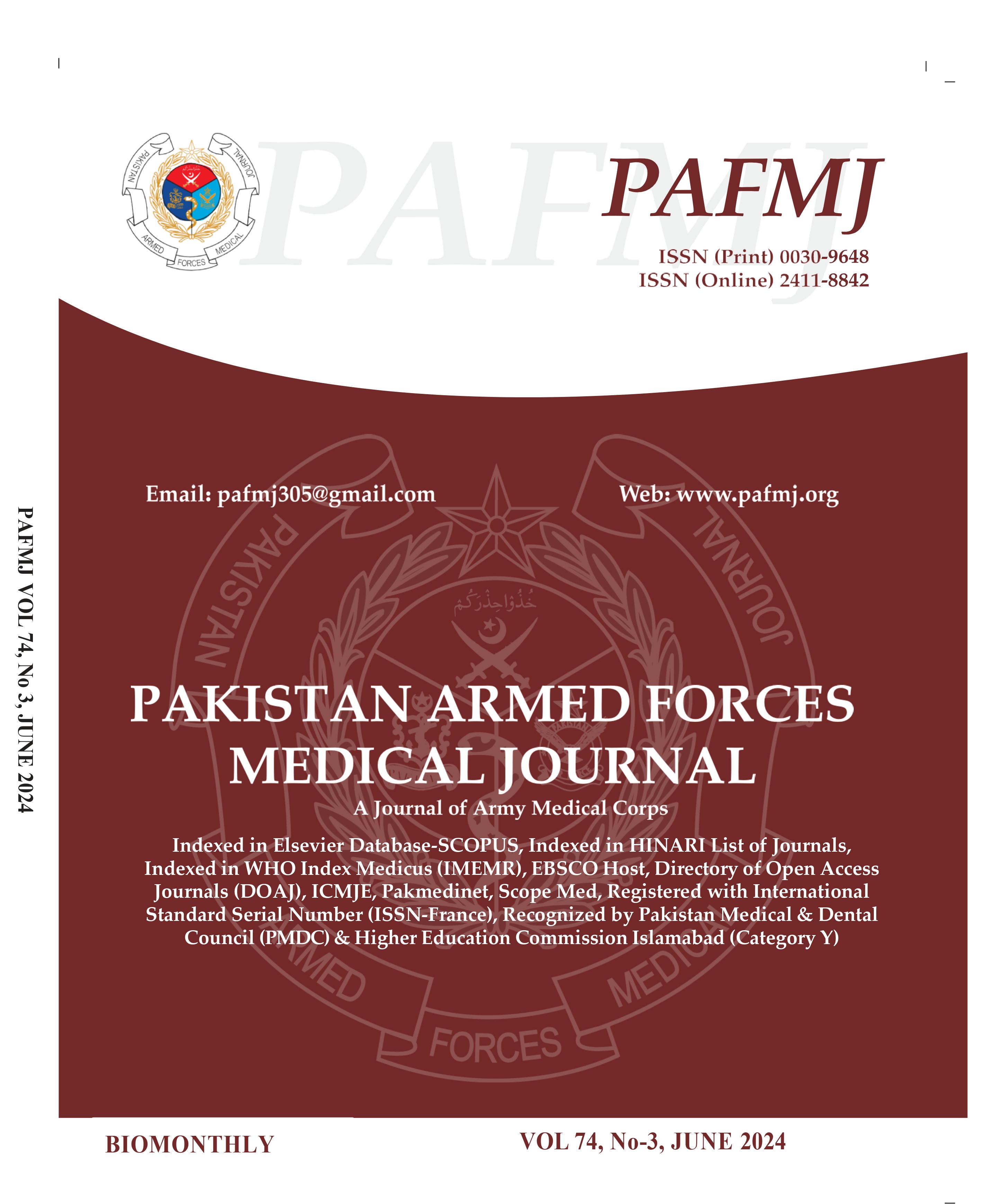Cognitive Impairment and Its Correlation with Depression
DOI:
https://doi.org/10.51253/pafmj.v74i3.12410Keywords:
depression, cognition, cognitive impairmentAbstract
Objective: To determine the correlation between the severity of depression and cognitive impairment.
Study Design: Cross-sectional study.
Place and Duration of Study: Department of Psychiatry, Combined Military Hospital, Gujranwala, Pakistan from May 2016 to December 2016.
Methodology: The cross-sectional study was conducted on outpatients in the Department of Psychiatry at Combined Military Hospital Gujranwala. The diagnosis of depression was made based on the WHO's ICD10 diagnostic criteria, and symptom severity was assessed using the Beck Depressive Inventory. Deirdre M. used the Montreal Cognitive Assessment version 7.1 to assess cognitive impairment.
Results: Eighty-six subjects were included in this study. A comparison of cognitive impairment and depression revealed that in a total of 16 subjects with minimal depression, only 5 had cognitive impairment; in 14 subjects with mild depression, 11 showed cognitive impairment; 26 subjects had moderate depression, out of which 18 showed signs of cognitive impairment; and among 30 subjects with severe depression, there was cognitive impairment in 25 individuals. The Spearman correlation showed a weak correlation of 0.321 (p<0.001).
Conclusion: A high level of depressive symptoms, although weak, is significantly correlated with cognitive impairment.
Downloads
References
Afridi MI, Hina M, Qureshi IS, Hussain M. Cognitive disturbance comparison among drug-naïve depressed cases and healthy controls. J Coll Physicians Surg Pak 2011; 21(6): 351-355.
Lam RW, Kennedy SH, Mclntyre RS, Khullar A. Cognitive dysfunction in major depressive disorder: effects on psychosocial functioning and implications for treatment. Can J Psychiatry 2014 ; 59(12): 649-54.
https://doi.org/10.1177%2F070674371405901206
Austin MP, Mitchell P, Goodwin GM. Cognitive deficits in depression: possible implications for functional neuropathology. Br J Psychiatry 2001; 178: 200-206.
https://doi.org/10.1192/bjp.178.3.200
McIntyre RS, Cha DS, Soczynska JK, Woldeyohannes HO, Gallaugher LA, Kudlow P, et al. Cognitive deficits and functional outcomes in major depressive disorder: determinants, substrates, and treatment interventions. Depress Anxiety 2013; 30(6): 515-527.
https://doi.org/10.1002/da.22063
Hasselbalch BJ, Knorr U, Hasselbalch SG, Gade A, Kessing LV. Cognitive deficits in the remitted state of unipolar depressive disorder. Neuropsychology 2012; 26(5): 642-651.
https://doi.org/10.1037/a0029301
Hammar A. Automatic and effortful information processing in unipolar major depression. Scand J Psychol 2003; 44(5): 409-413.
https://doi.org/10.1046/j.1467-9450.2003.00361.x
Baune BT, McAfoose J, Leach G, Quirk F, Mitchell D. Impact of psychiatric and medical comorbidity on cognitive function in depression. Psychiatry Clin Neurosci 2009; 63(3): 392-400. 10.1111/j.1440-1819.2009.01971.x
Scheurich A, Fellgiebel A, Schermuly I, Bauer S, Wölfges R, Müller MJ. Experimental evidence for a motivational origin of cognitive impairment in major depression. Psychol Med 2008 ; 38(2): 237-246.
https://doi.org/10.1017/S0033291707002206
Reppermund S, Ising M, Lucae S, Zihl J. Cognitive impairment in unipolar depression is persistent and non-specific: further evidence for the final common pathway disorder hypothesis. Psychol Med 2009 ; 39(4): 603-614.
https://doi.org/10.1017/S003329170800411X
Martinez-Aran A, Vieta E, Torrent C, Sanchez-Moreno J, Goikolea JM, Salamero M, et al. Functional outcome in bipolar disorder: the role of clinical and cognitive factors. Bipolar Disord 2007 ; 9(1-2): 103-113.
https://doi.org/10.1111/j.1399-5618.2007.00327.x
Årdal G, Hammar Å. Is impairment in cognitive inhibition in the acute phase of major depression irreversible? Results from a 10-year follow-up study. Psychol Psychother 2011; 84(2): 141-150. https://doi.org/10.1348/147608310X502328
Baune BT, Miller R, McAfoose J, Johnson M, Quirk F, Mitchell D. The role of cognitive impairment in general functioning in major depression. Psychiatry Res 2010; 176(2-3): 183-189.
https://doi.org/10.1016/j.psychres.2008.12.001
Porter RJ, Gallagher P, Thompson JM, Young AH. Neurocognitive impairment in drug-free patients with major depressive disorder. Br J Psychiatry 2003; 182: 214-220.
https://doi.org/10.1192/bjp.182.3.214
Lerner D, Adler DA, Rogers WH, Chang H, Lapitsky L, McLaughlin T, et al. Work performance of employees with depression: the impact of work stressors. Am J Health Promot 2010; 24(3): 205-213.
https://doi.org/10.4278/ajhp.090313-QUAN-103
Katon W, Richardson L, Russo J, McCarty CA, Rockhill C, McCauley E, et al. Depressive symptoms in adolescence: the association with multiple health risk behaviors. Gen Hosp Psychiatry 2010; 32(3): 233-239.
https://doi.org/10.1016/j.genhosppsych.2010.01.008
Irfan U, Khalid S. relationship between cognitive impairment and depressive symptoms. J Med Sci. 2011; 4(3): 122-127.
McIntyre RS, Xiao HX, Syeda K, Vinberg M, Carvalho AF, Mansur RB, et al. The prevalence, measurement, and treatment of the cognitive dimension/domain in major depressive disorder. CNS Drugs 2015; 29(7): 577-589.
https://doi.org/10.1007/s40263-015-0263-x
Giri M, Chen T, Yu W, Lü Y. Prevalence and correlates of cognitive impairment and depression among elderly people in the world's fastest growing city, Chongqing, People's Republic of China. Clin Interv Aging 2016; 11: 1091-1098.
Downloads
Published
Issue
Section
License
Copyright (c) 2024 Sikandar Ali Khan, Jawad Jalil, Mehreen Sajjad

This work is licensed under a Creative Commons Attribution-NonCommercial 4.0 International License.















